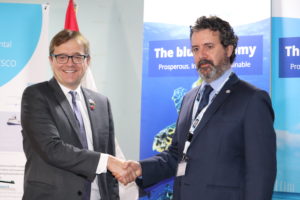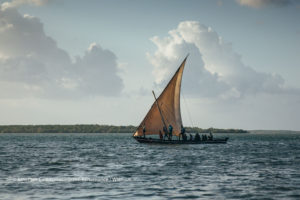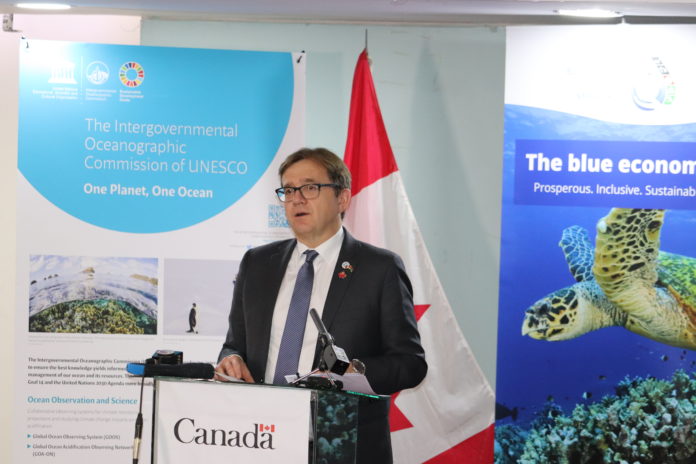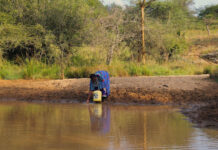By Dr. Vladimir Ryabinin
When world leaders, policy-makers and industry representatives meet in Nairobi for the upcoming Sustainable Blue Economy Conference there will be much talk of how the ocean, with its estimated US$1.5 trillion economy, can help countries and industries grow.
These are valid arguments. The ocean, through services and resources, holds great potential to eradicate poverty, ensure food security, generate employment, bolster technological innovation, and improve our general well-being.
 However, when human activities already threaten the health of marine resources and ecosystems at what cost and peril will we dive into the huge, yet untapped economic potential of the blue economy? From aquaculture to blue biotechnology, to marine mineral resource exploration, the euphoria for the blue economy could lead to an offshore gold rush with catastrophic implications.
However, when human activities already threaten the health of marine resources and ecosystems at what cost and peril will we dive into the huge, yet untapped economic potential of the blue economy? From aquaculture to blue biotechnology, to marine mineral resource exploration, the euphoria for the blue economy could lead to an offshore gold rush with catastrophic implications.
Fortunately, we are still at safe distance from this gold rush scenario. There is time to transition into a truly sustainable blue economy that promotes inclusive growth, advances human development, and provides solutions to environmental challenges.
UNESCO, via its Intergovernmental Oceanographic Commission (IOC), is committed to supporting this global transition, but success will require a major change in how governments and economic actors value ocean science.

Our message in Nairobi is clear: science must be at the forefront, not the sidelines, of the blue economy debate. Only through strong scientific research can we deliver a sustainable ocean.
With marine spatial planning – “urban planning for the sea” – we have developed an effective policy and stakeholder engagement process to analyze and allocate across space and time oft-competing human activities (tourism, renewable energy, fisheries, conservation, etc.) in coastal and marine areas.
At a fundamental level, however, tools such as marine plans must rely on quality data and strong knowledge of the ocean environment. Our planning is only as robust as our knowledge, and our knowledge only as extensive as the investment and political priority placed on scientists and their infrastructure.
New technological developments around big data, artificial intelligence, and automated observation are waiting to be properly harnessed and incorporated into ocean planning processes.
So are actors across different fields and regions. We already see emerging trends in transdisciplinary research involving universities, research institutions, industries, indigenous populations, and many other groups. We must find champions to support, facilitate and bolster these efforts.

The United Nations is uniquely placed to provide a universal framework for science-based ocean action – and it is poised to do so through a major upcoming initiative set to launch in 2021: the UN Decade of Ocean Science for Sustainable Development. This ten-year (2021-2030) global framework to foster scientific research and advance technological innovation will overhaul how and why we do ocean science. Less driven by curiosity than by social objectives, science should go beyond the laboratory to meet the needs and concerns of the diverse actors that make up the ocean community.
Despite considerable fluctuations, governments have been supporting science. According to the 2017 Global Ocean Science Report, the first-ever stock-taking exercise on global ocean science capacities, most of the ocean science today comes from public sources. But for how long can we rely on governments alone to foot the bill for a healthy ocean?
The OECD forecasts that by 2030 the bulk of investment in ocean science will come from private, not public funding. It is imperative that we start building a relationship of trust and mutual benefit with emerging private actors.
Maybe a good start is to rethink the concept of the Blue Economy as a virtuous circle where the ocean provides services and resources (e.g. food, energy, shipping lanes), and economic actors, in turn, invest in marine observations, exploration, and research.
Driven by science and guided by knowledge, the very nations, and industries looking for additional sources of growth and prosperity in the ocean could hold the key to a healthy and ever-more profitable ocean.
The writer is an Executive Secretary of Intergovernmental Oceanographic Commission of UNESCO














